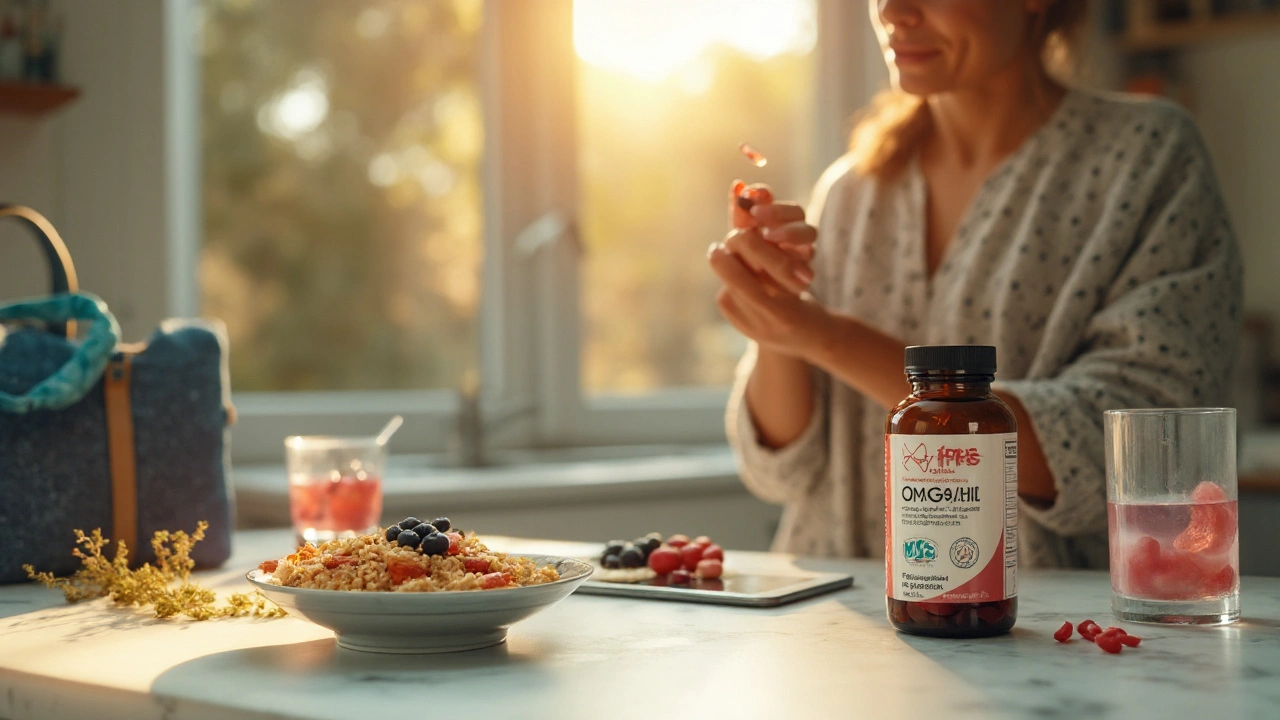If you ever battled tough acne—like the cystic, deep kind that makes you want to avoid mirrors—then you’ve probably heard of Accutane. It’s a name that can spark hope or send a chill down your spine, depending on your experience or the horror stories you found late at night on Reddit. This isn’t just another pimple cream; it’s a heavy hitter in the world of acne treatment, and people swear it either saved their skin or made them wish for a do-over. The truth? It’s complicated, a little misunderstood, and surprisingly fascinating once you look under the hood.
What Actually Is Accutane?
Accutane isn’t some magical elixir whipped up in a back room. Its real name is isotretinoin, and it’s a form of vitamin A that arrived on the scene back in 1982, transforming the acne game for good. Dermatologists started using it for the nastiest, most treatment-resistant cases—the stuff that antibiotics, creams, and conventional wisdom just couldn’t touch. Let’s be real: nobody goes on Accutane for a couple of blackheads. It’s reserved for when your skin feels like it’s at war with itself.
What makes this drug wild is how effectively it stops acne at the source. Isotretinoin works by shrinking your oil glands (yes, actually making them smaller), so they pump out less sebum, the greasy stuff acne-causing bacteria love. A 2017 review in the Journal of the American Academy of Dermatology broke down that sebum production drops by up to 90% in patients on Accutane. And it’s not just about less oil. The drug also tames inflammation, unclogs pores, and might even cut down your acne bacteria. People see breakouts fade, red marks calm down, and, sometimes, scars look a bit softer. No wonder some folks dub this little pill the closest thing to a cure.
If you’re thinking of Accutane as a permanent solution, here’s a number to know: studies show about 70% of users get clear skin after one full course and stay that way for years. That success rate blows topical treatments out of the water. Still, 20–30% might need a second round—especially if they start young, have hormonal triggers, or don’t tolerate high doses. Even the tough cases get decent odds, though, which is rare in the acne world.
Why Accutane’s Reputation Is So Intense
Most medications don’t get nicknames like “the nuclear bomb for acne”—but Accutane does. The main reason is the side-effect profile, and let’s not sugarcoat it: this drug can mess with you. Dry lips and cracked skin are nearly universal. In surveys, nine out of ten patients complain about lips so chapped they bleed. Even your eyelids might get flaky, and nosebleeds become a regular thing. Lotion and lip balm turn from nice-to-haves to must-haves. People load up on Aquaphor by the tub, no joke.
But then there are the side effects that get more attention—and stir up fear. Mood changes, like anxiety and depression, are controversial. Some research links isotretinoin to changes in serotonin levels, but the most extensive 2020 data shows no clear-cut cause-and-effect; people with severe acne are already more prone to mood swings, which complicates things. Joint pain, muscle aches, and night vision trouble are genuine risks, too. There’s even evidence in some folks that Accutane might temporarily raise cholesterol and liver enzymes. Monthly blood tests aren’t optional; they’re required, with limits set for how much alcohol you can have.
Nothing compares, though, to the strict pregnancy warnings. Isotretinoin is highly teratogenic, meaning it can cause severe birth defects—spinal cord issues, heart malformations, even missing body parts if taken during pregnancy. That’s why everyone capable of becoming pregnant must join the iPLEDGE program in the US, guarantee two forms of contraception, or agree to regular pregnancy tests. It’s extremely controlled for a reason—the risks are no joke.
Accutane also impacts other parts of life, like sensitivity to sunlight, so sunscreen is non-negotiable. And there are weird little surprises, like possible nose or gum bleeding, or hair thinning. These are usually reversible but can freak people out. The good news? Most side effects fade after you stop the treatment. The dry skin, aches, and even blood levels go back to baseline in a few months, according to large studies tracked by dermatology clinics in the US and UK. Serious problems like long-term depression or liver issues are extremely rare, but not impossible, so honesty with your doctor matters.
The Science Behind How Accutane Works
Let’s dig into the science. Your average breakout starts with oil—your sebaceous glands produce more than needed, which mixes with dead skin and clogs up pores. Add some bacteria, and boom: acne. Isotretinoin breaks this cycle in four major ways:
- Reduces Sebum: It shrinks sebaceous glands, cutting oil production by up to 90% within weeks.
- Unclogs Pores: Normalizes how skin cells shed, so they don’t pile up and block things.
- Tames Inflammation: Suppresses some of the rogue immune reactions behind redness and swelling.
- Fights Bacteria: While it doesn’t kill acne bacteria directly, less oil means they don’t have as much food, so colonies shrink.
That full-body effect is why Accutane wipes out severe cystic acne—not just face pimples, but back, chest, and even buttocks. But this also explains the side effect spread: the skin gets dry everywhere, and every oil gland shrinks, not just on your cheeks.
One fascinating thing: studies show isotretinoin changes gene expression related to skin turnover, permanently altering how your body handles sebum. That’s why, for many, the results really stick. Of course, not everyone walks away with flawless skin forever, but the relapse rate is far lower than antibiotics or hormonal therapies.
Doctors tailor dose and duration for each patient. Most aim for a cumulative dose of around 120–150 mg per kg of body weight; this seems to limit relapses. Some go “low and slow” for minimal side effects, others push higher doses for stubborn cases. Check this out—a 2021 survey showed that shorter, lower-dose courses may have fewer initial breakouts, less mood impact, and similar long-term results for moderate acne. Still, the high-dose model remains standard for truly resistant skin, especially with scarring.
Now, Accutane is powerful, but not magic. There’s a real phase called “the purge,” when breakouts flare up before getting better—sometimes for weeks. That’s normal as clogged pores clear, but rough on your confidence. Sticking it out pays off for most, if you can handle the ride.

Living with Accutane: Practical Tips and Real Talk
If your doctor’s handing you a script for isotretinoin, here’s the scoop on surviving the ride. First rule: prep your bathroom cabinet. You’ll need lip balm with lanolin or petroleum jelly, thick moisturizers like CeraVe or Vanicream, gentle cleanser, sunscreen, and a hat for any sunny walks. Avoid harsh scrubs, retinoids, or peels—they’ll just wreck your sensitive skin. Shower filters help if your water’s hard, and keep humidifiers on for overnight dry air relief.
Stock up on soft, fragrance-free tissues for those nosebleeds, and keep eyedrops on hand (isotretinoin dries out your eyes almost as much as your lips). Skip contact lenses if your eyes are super irritated. If your joints start aching, gentle exercise—think yoga or stretching—helps more than pounding the treadmill. Stay hydrated. You’ll hear that advice a ton, but it really does make a difference.
- Don’t skip monthly bloodwork. Labs check your liver, kidneys, cholesterol, and make sure the drug isn’t causing hidden problems. These tests catch side effects before they go off the rails.
- Let your pharmacy know you’re on Accutane—some antibiotics and supplements can mess with your system, and vitamin A might spike to unsafe levels.
- Tell your friends and family how you’re feeling, especially if your mood drops. Depression is rare, but having people close who notice changes helps a ton.
- If your period gets weird or you spot sudden side effects, get in touch with your dermatologist fast.
Alcohol and Accutane don’t mix well—your liver’s working overtime. Most docs say limit drinks or cut them out entirely. Sunblock isn’t optional, so make it a habit. If you get night vision troubles (hard to see in dim light, halos around headlights), don’t drive after dark until it passes.
Some athletes worry Accutane will cut their performance. You might feel a bit more joint soreness, but pro athletes have finished seasons while on it—including Olympic swimmers and NBA players, according to interview roundups in the athletic press. Work with your trainer or coach if you’re in a competitive season.
The most surprising tip? If you’re planning dental surgery or waxing, hit pause. Accutane slows skin healing, so wait at least six months post-treatment before any deep skin or dental procedures.
| Side Effect | How Common? | Usually Temporary? |
|---|---|---|
| Dry lips (cheilitis) | 90% | Yes |
| Dry skin | 75% | Yes |
| Nosebleeds | 35% | Yes |
| Joint/muscle pain | 25% | Usually |
| Temporary hair thinning | 10% | Yes |
| Mood changes | 5-10% | Usually |
| Permanent side effects | <1% | No |
When it’s all over? Take a week, breathe, and get to know your skin again. You can finally go minimal on products and, for a lot of people, you’ll care way less about breakouts going forward.
How to Know if Accutane Is Right for You
This drug isn’t for everyone, and that’s a good thing. If your acne isn’t causing physical or emotional scars, or it responds to benzoyl peroxide, topical retinoids, or oral antibiotics, you probably don’t need this nuclear option. Accutane’s best for cases where other treatments flopped, or breakouts leave craters and marks that remind you of them every morning.
If you’re on birth control or can guarantee pregnancy won’t happen, and you don’t have a history of mental health issues that Accutane might worsen, you’re a solid candidate. Some people rethink it after hearing the risk rundown, especially if they’re skittish about blood tests or routine doctor visits. This isn’t one of those “set it and forget it” meds—you need regular monitoring and discipline.
Teens make up nearly two-thirds of Accutane users in clinical data, but adults in their 20s and 30s can safely take it too. One myth still floats around: that Accutane permanently weakens bones or stunts growth. Large population studies in Europe and North America found no such risk when it’s prescribed and monitored properly, even for months at a time. You just need good medical supervision and honest conversations with your dermatologist.
For those who really struggle with acne’s mental impact, it can feel life-changing. Users talk about finally feeling confident dating, swimming, or taking selfies—without worrying about hiding or explaining breakouts. The cost, which varies by country and insurance, can add up (hundreds to over a thousand dollars in the US for a full course without coverage), but price assistance programs and generics have made it more reachable in recent years.
For people who’ve already cycled through antibiotics, hormonal pills, spironolactone, or blue light therapy with no luck, Accutane isn’t just another shot in the dark. It’s the only med with the power to really reset severe acne and help avoid permanent scars, and the data has held up for over 40 years. Still, if you hate the idea, that’s fair—nobody should feel pressured into a medicine that makes them nervous.
The Long-Term Impact: Life After Accutane
So, you finish your course, toss the last green-and-orange pill, and stare in the mirror—not expecting miracles, but hoping for something close. For most, the serious breakouts stop, and you get to meet the skin hiding underneath all that inflammation. It’s like someone cranked down the oil dial for good. Red marks and dark spots fade over a few months, and a solid skincare routine (think gentle cleanser, a light moisturizer, sunscreen) keeps your new skin happy.
How long do results last? Decades, for a lot of people. In a huge Swedish follow-up study, over 60% of people were still clear ten years after treatment. The stats don’t lie—the majority never need round two. Those who do usually need a much shorter, lower dose treatment, and the tough side effects tend to be less intense after your first course.
There’s a real mental shift after finishing Accutane. You get more comfortable socializing, being spontaneous, sweating at the gym, or skipping makeup. Some people admit it’s like the world gets a little wider—fewer excuses, more direct eye contact. Nobody’s claiming it’s perfect; a few see mild breakouts pop back up, and everyone still gets an odd pimple here and there. But for folks who dealt with deep cysts for years, this improvement feels dramatic.
The risk of serious long-term problems is very low. People who finish healthy almost always stay healthy, though sticking with annual bloodwork and check-ins never hurts. The skin stays a bit drier long term, so learning to moisturize is key. Hair thinning, if it happened, nearly always reverses over six months to a year.
If you’re thinking about Accutane, make this decision armed with facts, not fear or hype. Find a dermatologist who listens, ask questions about everything that worries you, and be ready for ups and downs. For many, Accutane is a turning point—a tough, but often rewarding, leap toward clearer skin and a different way of seeing themselves.




